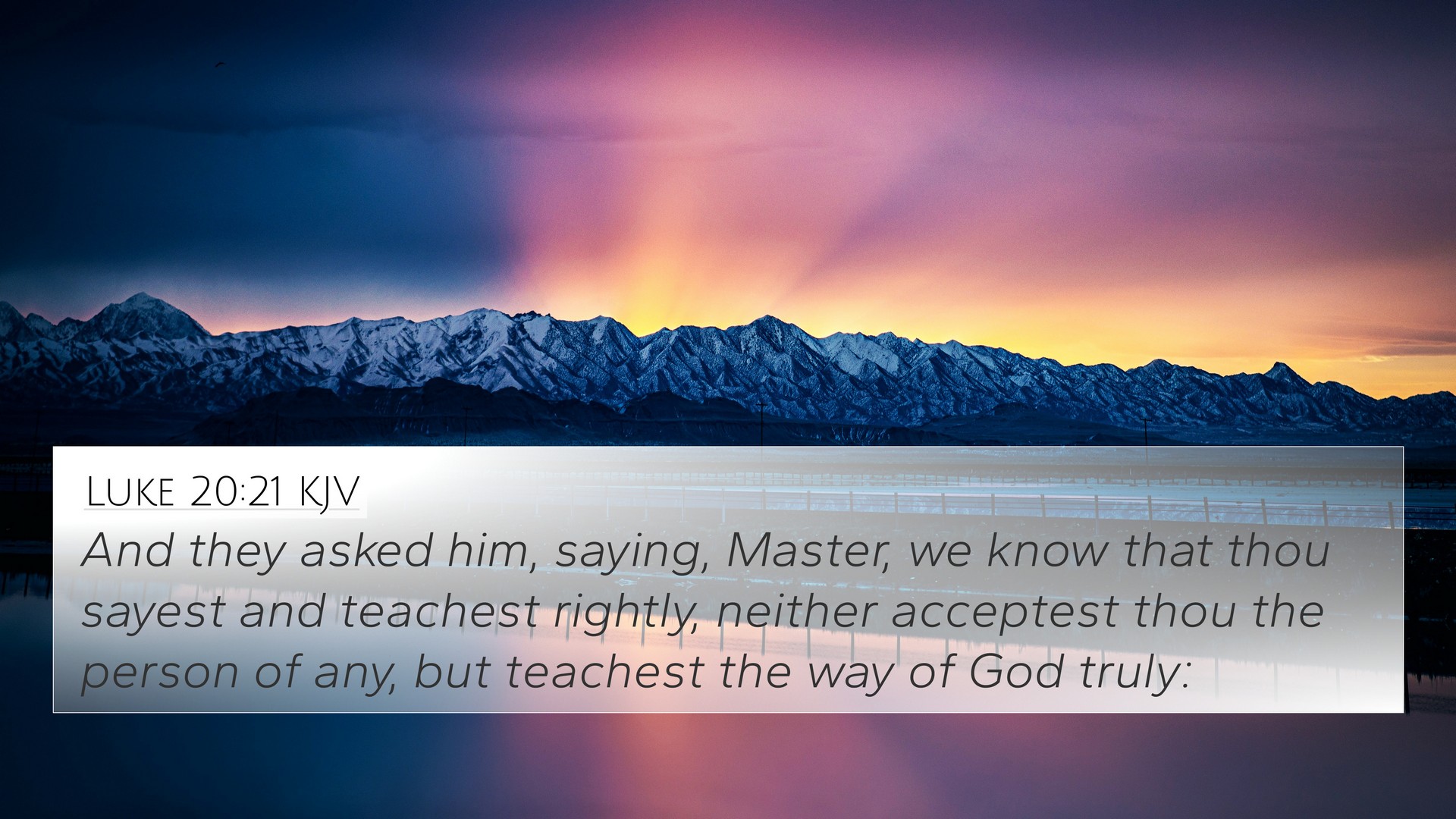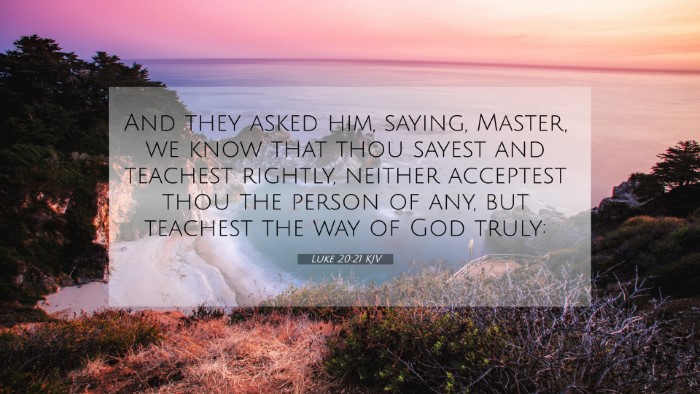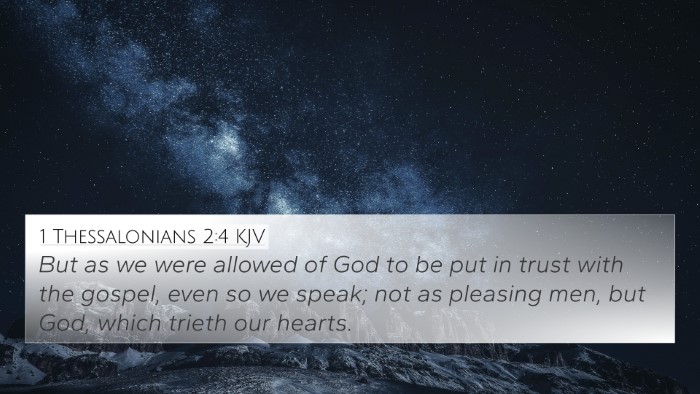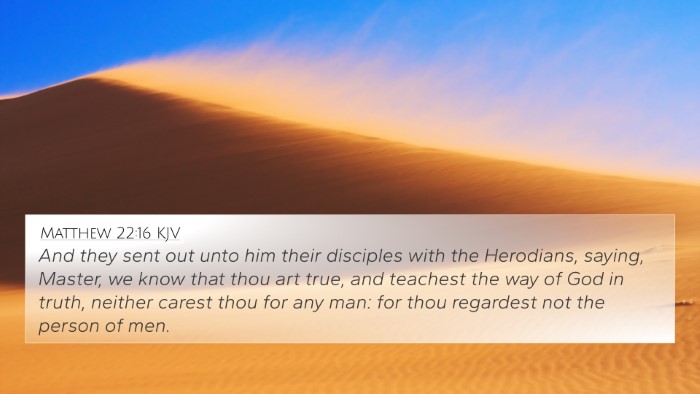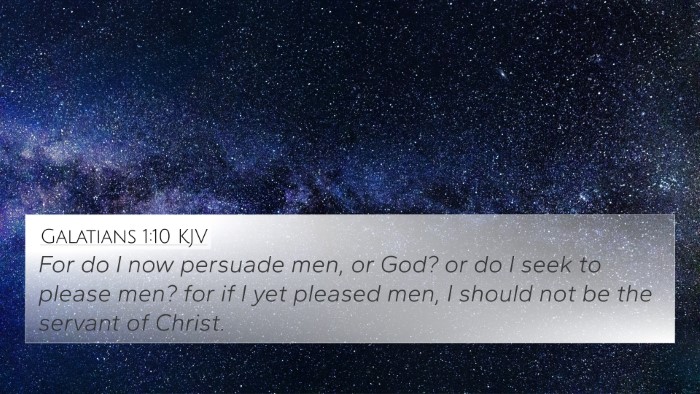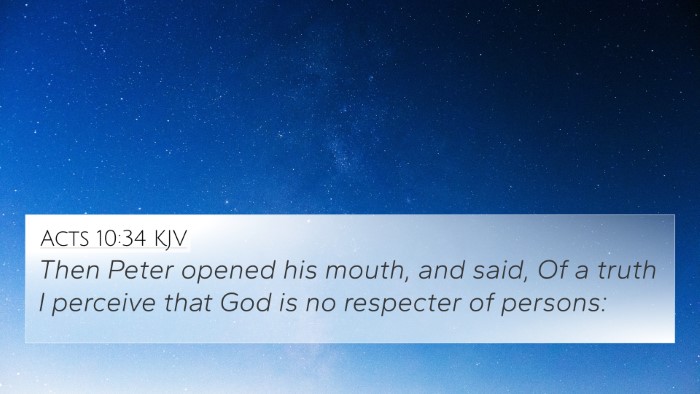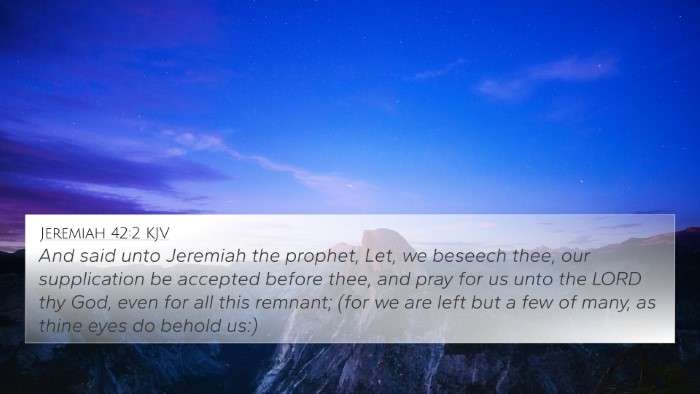Understanding Luke 20:21
Luke 20:21 states: "And they asked him, saying, Master, we know that thou sayest and teachest rightly, neither acceptest thou the person of any, but teachest the way of God truly." This verse captures a significant moment in the dialogues between Jesus and the religious leaders of His time. The context provides crucial insights into how Jesus was both viewed and challenged by those in authority.
Summary of the Meaning
This verse reflects the recognition of Jesus' integrity and impartiality in teaching God’s truth. The interrogators acknowledge that He does not show favoritism and consistently teaches the divine way. Their inquiry hints at their ulterior motives while validating Jesus’ teaching authority.
Insights from Public Domain Commentaries
Matthew Henry's Commentary
Matthew Henry emphasizes that the question posed by His opponents was both a test and an acknowledgment of Jesus’ reputation. They recognized His commitment to truth and the manner in which He conducted His ministry. Henry suggests that their question reveals a tactical intent to entrap Jesus while also acknowledging His divine teaching.
Albert Barnes' Notes on the Bible
Barnes points out the importance of the phrase "neither acceptest thou the person of any," indicating that Jesus’ teachings were inclusive and not swayed by social status. This reinforces the Heavenly principle that God's truths are accessible to all, irrespective of their worldly position. Barnes portrays this moment as a critical point where the leaders’ intentions are transparent versus Jesus' consistent integrity.
Adam Clarke's Commentary
Clarke notes that the leaders’ acknowledgment of Jesus' teaching implies a temporary respect or admiration for His approach to God's law. He highlights the contradiction in their actions compared to their words, portraying a mask of recognition while plotting against Him. Clarke indicates that this reflects human behavior where acknowledgment of truth does not always lead to acceptance.
Cross-References with Luke 20:21
Luke 20:21 connects to several other Biblical texts, providing a broader understanding of the themes presented. Here are some relevant cross-references:
- Matthew 22:16 - Here, the Pharisees also attempt to flatter Jesus while trying to catch Him in His words.
- John 7:24 - Jesus teaches not to judge by appearances but to judge with righteous judgment, emphasizing truth over biases.
- Acts 10:34 - Peter acknowledges God shows no favoritism, resonating with the theme from Luke 20:21.
- James 2:1 - James speaks against partiality among believers, reinforcing the principle of impartiality seen in Jesus’ teachings.
- John 18:37 - Jesus affirms His mission is to bear witness to the truth, a principle echoed in the recognition of His teaching style.
- Romans 2:6-11 - These verses speak to God’s impartial judgment, linking the concept of divine fairness to Jesus’ ministry.
- Galatians 1:10 - Paul speaks about not seeking the approval of men, akin to Jesus’s approach of teaching without regard for personal gain.
Thematic Bible Verse Connections
Across scripture, the theme of impartiality and truth remains prevalent. Many verses throughout the Bible echo sentiments similar to those expressed in Luke 20:21:
- Deuteronomy 1:17 - God commands judges to not show partiality.
- Proverbs 24:23 - Warns against showing favoritism in judgment.
- Colossians 3:25 - States that wrongdoing will be punished, regardless of who commits it, further affirming divine impartiality.
Tools for Bible Cross-Referencing
For a deeper understanding of connections within Scripture, there are multiple tools available:
- Bible Concordance: A reference tool to find where specific words appear in the Bible.
- Bible Cross-Reference Guide: A resource for locating related verses on a specific topic.
- Cross-Reference Bible Study: A method employing associated scriptures to enrich personal study.
Cross-Referencing and Comparative Analysis
Engaging in comparative Bible verse analysis allows for a richer understanding of biblical themes. By examining links between Jesus’ teachings in the Gospels and corresponding teachings in the Epistles or the Old Testament, one can unfold deeper theological insights. This method encourages exploring the narrative connections and prevalent themes throughout God's Word.
Conclusion
Luke 20:21 showcases the challenges faced by Jesus and exemplifies how His teachings were perceived by the religious authorities of His time. The verse serves not only as a critique of their intentions but also as a celebration of Jesus’ unyielding commitment to truth and impartiality. Cross-referencing within scriptures enhances our understanding of these principles, allowing believers to glean wisdom from the interconnectedness of God’s message throughout the Bible.
